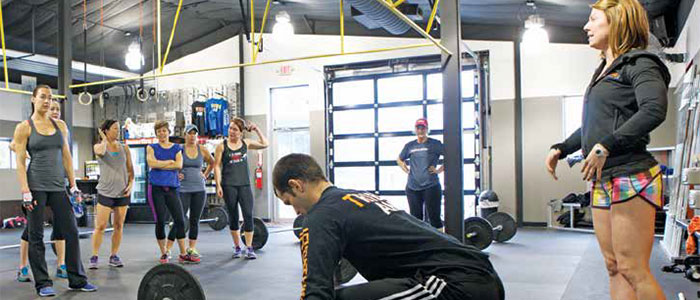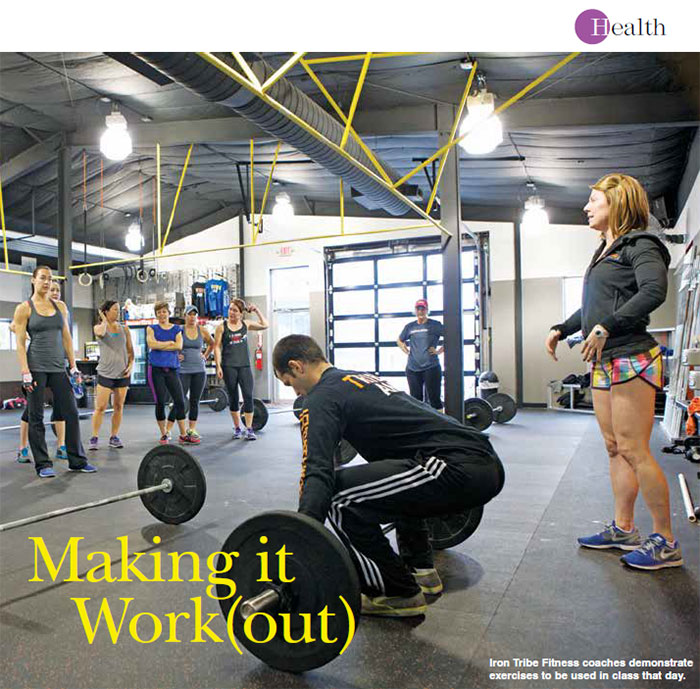
Even the most active among us are well aware how tough it is to start a fitness regime, or simply to keep one up. Between your other responsibilities and what you feel drawn to recreationally, it’s easy to let fitness fall by the wayside—even if this causes immense guilt. While habits are often hard to break, they’re also hard to make; a study by Dr. Maxwell Matz in the 1950s cited that it takes 21 days to form a habit, but health psychology researcher Phillippa Lally found in 2009 that her 12-week study of 96 people showed it actually took much longer. On average, it takes more than two months before a new behavior becomes automatic. Sixty-six days, to be exact—and this is subject to vary widely depending on the behavior, circumstances and the person.
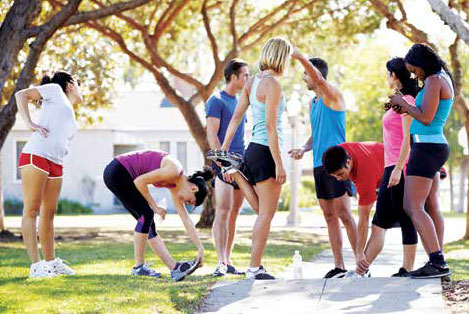 Luckily for Cobb County residents, there is no shortage of options when it comes to finding time to work out. Despite your busy schedule and your other demands, the opportunity to take your fitness fate into your own hands is all around you, from accessible outdoor areas like the Silver Comet Trail to the county’s outstanding fitness facilities. Sometimes it takes more than a little motivation, and knowing there’s always a way may be just what you need.
Luckily for Cobb County residents, there is no shortage of options when it comes to finding time to work out. Despite your busy schedule and your other demands, the opportunity to take your fitness fate into your own hands is all around you, from accessible outdoor areas like the Silver Comet Trail to the county’s outstanding fitness facilities. Sometimes it takes more than a little motivation, and knowing there’s always a way may be just what you need.
Expectations and Goals
It’s important when trying to form a good habit that your goals and expectations not only match but also are realistic and forgiving of your other responsibilities. Each person has a million reasons to skip their run today and say they’ll catch the next class or move the workout to tomorrow, but one good reason not to can make all the difference. “A fitness routine takes proper planning and effort to establish,” says Exercise Physiologist Sean Morgan with Northside Hospital. “Once the routine is broken, we often find it easier to regain momentum for maintaining the routine. Having short-term goals can help keep us on the right path.”
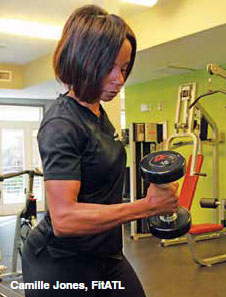 Camille Jones, owner of FitATL, agrees that starting small is the key to success. “The only thing harder than starting a fitness routine is restarting one!” she says. “For most of us, it takes a lot of effort and preparation to begin a workout routine. As you build momentum, it becomes a habit and a part of your lifestyle. If you break that routine, old habits rear their ugly head; that extra sleep in the morning feels really good or watching that reality TV show at night is so entertaining. That’s why I recommend starting small—even if it’s a half hour twice a week, you can most likely keep that up long-term and can go longer and more frequently as things progress.”
Camille Jones, owner of FitATL, agrees that starting small is the key to success. “The only thing harder than starting a fitness routine is restarting one!” she says. “For most of us, it takes a lot of effort and preparation to begin a workout routine. As you build momentum, it becomes a habit and a part of your lifestyle. If you break that routine, old habits rear their ugly head; that extra sleep in the morning feels really good or watching that reality TV show at night is so entertaining. That’s why I recommend starting small—even if it’s a half hour twice a week, you can most likely keep that up long-term and can go longer and more frequently as things progress.”
Once we realize we’ve fallen off the fitness wagon, it’s easy to make promises of grandeur about making up for it, especially if we’ve previously worked hard to get to where we were. Knowing what you want long term from your fitness regime is important, but something’s always got to give. Rather than promising yourself to make your own meals every night, take five new classes and clock in 20 miles a week. Start with smaller, more attainable fitness goals that are sensitive to the schedule of work and life you’ve already established. Go for a walk on your lunch break, park at the far end of the lot from the store or the office or challenge your coworkers to a round of push-ups every hour. “Research has shown that 10-minute exercise sessions have positive health benefits,” Morgan adds. “It may be more practical for a person with a busy schedule to exercise 10 minutes at a time throughout the day rather than taking up 30 minutes (or more) of their schedule.” These small breaks through the day are good for body and mind and can add up to make a big difference.
Jones also recommends trying to wake up 35 minutes early for one week to take five minutes to wake up and get dressed and the other 30 to walk or run, turn on an exercise DVD or try an online workout. You may mourn the extra sleep at first, but be your biggest fan—try to plan your sleep cycles so you wake up easier, drink plenty of water and avoid caffeine in the afternoon. After that first week is over, opt to do another, then another. Before you know it, your entire morning routine has been transformed for the better.
Jeff Wade, fitness general manager at Riverside EpiFitness Club in Austell, says missing a day or two isn’t the end of the world—or of your routine. “Our bodies need to get adequate rest between workouts to ensure that we stay fully energized and well hydrated before the next physical challenge!” he says. “It’s when we start missing a week or months that we should realize that we have a problem.” Wade has found that many will get discouraged by their unrealistic expectations of what results their hard work will return and decide it’s not worth the effort, but that small, achievable goals are the key. “Let’s face it, we are all busy,” he adds. “Even retired people are busy! If you want success at something you must make it a priority by allotting some time in your day for the activity. One common excuse I hear often is, ‘I am just too tired to exercise!’ Then, I find out that the person goes to bed at 12:30 a.m. every night and rises at 5 a.m. The first goal may be to try and go to bed at 9 p.m. and get a good eight hours of sleep for two weeks. Then, let’s see if they have more energy.”
Change Your Mindset
“The key to making daily exercise a habit is to have fun doing the activities, get results, be held accountable and preventing injuries along the way,” says Andy Berman, manager at Iron Tribe Fitness in east Cobb. “If missing a day or two of exercise makes it more difficult to get back into the routine then the routine or exercise program you were using was not very effective.” It’s hard to make excuses to get out of what you look forward to, and we should all look forward to being active throughout the day.
“As Aristotle once said, ‘We are what we repeatedly do. Excellence, then, is not an act, but a habit.’ While creating a new habit can be hard, in time they will become easier until they are naturally integrated into your life,” Berman says. “I do think anyone could argue that taking care of yourself should be at the top of the list. This includes a proper diet and an effective weekly exercise schedule. These activities will then have positive effects on the rest of your life.”
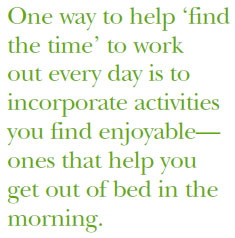 One way to help “find the time” to work out every day is to incorporate activities you find enjoyable—ones that help you get out of bed in the morning. Maybe you find a class with a great gym buddy who holds you accountable and always makes it fun, or you activate your competitive nature with group boot camp classes. “A well-rounded exercise program will include 10 characteristics: strength, endurance, stamina, flexibility, agility, accuracy, balance, power, speed and coordination,” Berman says. “You just can’t get all of these elements from small bouts of activity throughout the day. By working on all these elements through a fun exercise program, you will see amazing results.”
One way to help “find the time” to work out every day is to incorporate activities you find enjoyable—ones that help you get out of bed in the morning. Maybe you find a class with a great gym buddy who holds you accountable and always makes it fun, or you activate your competitive nature with group boot camp classes. “A well-rounded exercise program will include 10 characteristics: strength, endurance, stamina, flexibility, agility, accuracy, balance, power, speed and coordination,” Berman says. “You just can’t get all of these elements from small bouts of activity throughout the day. By working on all these elements through a fun exercise program, you will see amazing results.”
What’s Best? For Whom?
The secret’s out: There is no perfect, absolute concoction to achieve fast total fitness that will work identically for each person. However, we do know the basic tenants of feeling and looking your best: Get moving and eat a diverse diet rich in fruits and vegetables, opt for whole grains and monitor your protein consumption depending on how much you’re exercising for the best recovery. Is working out in the morning better than working out after leaving the office? “I like to think of this as a trick question,” Morgan says. “The best time of day is whatever time you exercise. Some people are early risers while others are not. Finding what is best for you is the best time of day.”
Always reassure yourself that something is better than nothing, but don’t settle on that. “Activity and exercise are two very different things that most people confuse,” Jones says. “Taking the stairs instead of the elevator, parking far away from the mall to increase your walking distance and playing in the backyard with the kids are examples of activity. Swimming multiple laps, taking a kickboxing class or hiking up a mountain are in the exercise category. You need both to improve overall health.” Often when you get into your routine, becoming more active in other areas of your life becomes natural—let it. “Don’t be a ‘sedentary athlete,’ who exercises multiple times per week but sits all day at work and in front of the TV at night,” Jones adds. “You also shouldn’t rely solely on activity, thinking that extra flight of stairs is all you need. It’s been proven that metabolism slows when you’re immobile. When in doubt, just get up and move!”
When you’re in the middle of production, have meetings scheduled back-to-back and need to be out of the office to get the kids before cooking dinner every night, knocking out a solid 60-minute cardio session can be unimaginable to fit in. “I know folks that work on developing their core strength [doing moving planks] for 10 minutes in the early morning while the coffee is brewing. During their lunch break, they lift weights at the health club nearby their office for 20 minutes. After work, they do a brisk three-mile walk with their spouse. This physical activity [and calories burned] all adds up!” says Wade.
“If exercise becomes an important part of your life, because you enjoy it, see the benefits and are part of a great community, then you can find 45 minutes at least three times a week for an effective program,” Berman assures. “We make time for what we feel is important. If we exercise, feel better and have more energy then the rest of our lives benefit, and we will actually gain more usable time in the day along with the exercise time. Taking time to exercise will equal even more time in my day? You bet!”
No matter your obligations, distractions, responsibilities or excuses, you have to help yourself be successful. “If you think you are too busy to exercise then you should re-prioritize your schedule. Our bodies are meant to move! The bottom line is you have to want it,” Wade says. “Want to get your blood pressure down so you can get off medication. Want to lose 50 pounds in order to have more energy. Want to be stronger. Want to just feel better!”










